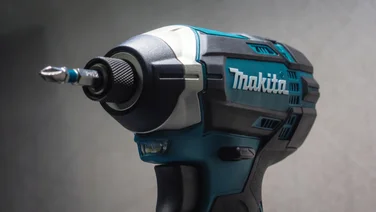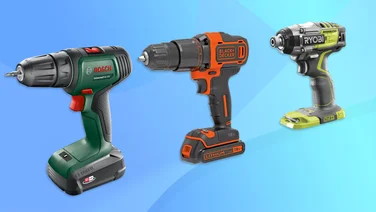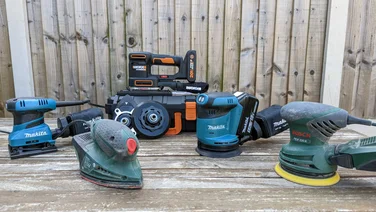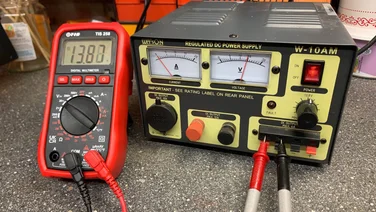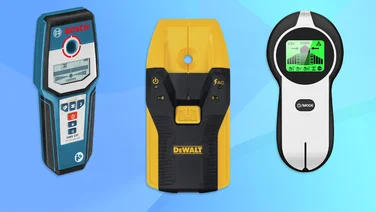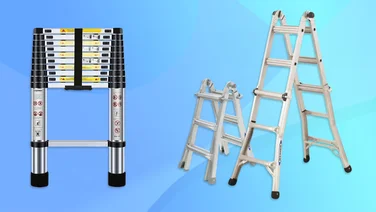To help us provide you with free impartial advice, we may earn a commission if you buy through links on our site. Learn more





- Comparatively light and easy to handle
- Ample power for most household DIY jobs
- Good value
- Not powerful enough for more demanding projects
- Bit can sometimes come out mid-task
The Black + Decker BCD383 is a cordless hammer drill aimed squarely at the home DIYer and priced to match. Its two-speed 18V motor can dish out up to 45nm of torque at the highest of its ten screwdriver settings, while its hammer action makes it more effective on masonry jobs than your average cordless combi drill. It comes in a range of different bundles with or without a carry case, charger and batteries, and while we’ve tested the BCD383D1XK version, with a single 2Ah battery and charger, you may find other versions with two batteries available for similar money.
But is it worth buying at all? Having put this drill through its paces, I’ll let you know below.
What do you get for the money?
The BCD383D1XK version comes with the cordless drill, 2Ah battery and charger, attachable belt hook and a double-ended Phillips/flat head screwdriver bit, all contained within a basic black plastic carry case.
The drill itself sticks pretty close to previous Black + Decker designs. It measures 209mm from the back to the tip of the chuck and weighs in at 1.05kg without the battery attached, which adds an extra 396g. The grip uses a textured, rubberized material that slightly cushions the hand from vibration and makes it easier to maintain a firm hold, and the drill feels well-balanced whether you’re holding it horizontally, vertically or on its side.





The controls keep things simple, with a single collar that twists around for the ten torque settings and drill and hammer modes, a click through switch above the trigger for forward/reverse and a sliding switch at the top to go from speed 1 to speed 2. The trigger’s sensitive to pressure, so you can keep things slow with a gentle squeeze or speed up by applying more pressure. The chuck is keyless and can handle bits of up to 13mm in size.
The charger provided is as basic as they come, slipping onto the top of the battery rather than acting as a cradle. With a 20V/1A maximum supply it’s not exactly fast, but it can still charge the 2A battery in just under two hours.
What’s it like to use?
The BCD383 is easy to handle and compact enough to work in most situations. I used it to handle the replacement of a marine ply ceiling in a porch and work on a decking repair project, and in both scenarios it coped well with a range of drilling and screw-driving tasks, fitting into awkward spaces getting the job done. The one negative I did find was that in some situations where there’s not quite enough power to drill a hole or drive a screw into place, the chuck would sometimes loosen up and leave the drill bit hanging or drop the screwdriver bit. This gets a little annoying when you’re right in the middle of the job.
How does it perform?
Very well for basic DIY jobs. Most holes were drilled and screws screwed in without any trouble. I could even get 8mm self-tapping screws to screw directly into softwood, though 10mm screws were more of a challenge. Getting larger bits into the marine ply to create room for a saw to work was a bit more of a task, requiring pressure on the back of the tool, but I could do it with a bit of time and effort.





Thanks to its hammer action, the BCD383 can also handle light masonry. However, if you’re putting in 10mm to 12mm heavy duty wall plugs into brick or breeze blocks, then it’s going to be more work than with more powerful hammer drills like the Erbauer ECDT18-Li-2 or DeWalt DCD799P2T. The bit will work its way into concrete or brickwork, but we’re not exactly talking knife through butter.
The BCD383 isn’t fiendishly noisy. I measured the sound output at 72dBA with the chuck spinning freely, though you’ll get more noise when it’s actually screwing or drilling.
Should you buy the Black + Decker BCD383?
This is a solid, affordable all-rounder for mainstream DIY tasks, with enough welly to manage some occasional heavy-duty work. It’s not the kind of drill you should buy for a serious renovation project, but it’ll easily take on the kind of jobs that most households need tackling every year, not to mention assembling flatpack furniture or general shed and garden work. The Bosch UniversalDrill 18V has a little more power, but it’s also heavier and more expensive. If you’re on a tight budget, the BCD383 is a capable alternative.


